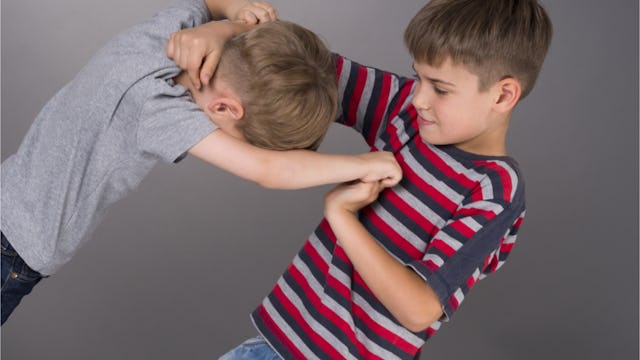It's Hard When Your Kid Hits Other Kids, But You're Not Alone

Nobody wants to be the mom of the kid who hits other kids.
Nobody wants to be the mom of the kid that nobody wants to play with, and who wants to be on the receiving end of the dirty looks from the other moms? Certainly not me.
I have tried to drill into my son’s head, from an early age, that we do not hit other people. Hands are not for hitting. Hitting doesn’t solve any of our problems, and when you hit, people no longer want to play with you.
But because he’s a toddler, it happens. He gets upset, or can’t find his words, and he hits someone at the park or play group. He’s a hitter, despite my best efforts. And when this happens, I literally want to make myself as small as possible and disappear.
But disappearing is not an option. I’ve tried a bunch of times, and dammit, I’m still here. So what do you do?
Well, I clearly do not have all the answers, but I’ve found some things that help.
Time-outs can work for some kids, but not the forced isolation that will likely just increase their anger. The kind of time-out where you remove your kid from the situation and coach them through it — explaining why the behavior was inappropriate, how their friend feels now, and offer solutions for making it better.
Yelling tends to make me look stark raving mad and solves nothing, so usually it’s the low tone warning. You know the one, where most of your words are trying to escape from in between gritted teeth. “You sit down here, and if I have to tell you not to put your hands on someone else again we’re going home.” Then they sit there pouting for five minutes trying to gain the sympathy of passersby. Sometimes someone will implore you to cut the kid some slack, and sometimes they congratulate you for standing your ground.
Then you have to do the big apology. My kid will often say he’s sorry through the residual tears of the time-out mentioned above. Other times, they may not be willing to apologize, but they can watch you apologize and model the behavior you’d like to see from them.
One more reminder about keeping our hands to ourselves and using our words, and then he’s off and running again. And I’m sitting in the corner praying that it doesn’t happen again. Partially because I don’t want to have that asshole kid, but also because I’m not strong enough for the fight that going home would bring. I would take him home, no doubt, but forcing a kid to leave their fun zone is never a fun process.
I know it’s not always malicious; sometimes he just gets too excited and he may shove a kid, or not acknowledge personal space. Other times, because toddlers, he just doesn’t realize that he’s being unnecessarily handsy or rough. These times are actually more nerve-racking than when the hitting is intentional, because at least when it’s intentional, you know how to handle it. But when it’s accidental, it’s tricky. They are not being bad, but they need to learn to respect boundaries and pick up on social cues, so it’s important not to let those moments pass without acknowledgement. Learning consent, and respect for bodily autonomy, starts early.
Nobody wants to be the parent of the kid who hits. This kid is often labeled as a jerk, brat, or worse. We all know how great our kids are, but it’s hard to tell little Timmy’s mom that your kid is really sweet, it’s just that sometimes he’s turns into a red-faced hellion and hits people. You just want to dig a hole in the ground and hide in it until Timmy and his mom go home and she stops giving you dirty looks across the playground.
Sometimes you want to wear a sign that says “Don’t hate me because my kid can be an asshole. I swear I’m a good mom.” It might cost a lot to get that printed on a T-shirt, but I might just look into it.
Kids who hit aren’t bad kids, and it’s not that they lack discipline or home training. It’s a normal developmental phase because they are people who are learning to navigate their world. Flawed little people who are still learning how to properly display their emotions and how to react to conflict. Don’t write them off as “that kid” just yet.
And mamas, don’t take it personally. You know your kid, and if this could be the symptom of something bigger, then it’s your job to address that. But more often than not, it’s just a phase that they’re trying out. It’s embarrassing as hell for us as parents, but the only thing we can do is just keep loving them and teaching them and guiding them to be the good, kind people we know they are.